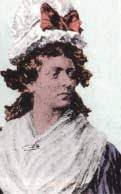What was the role of women in the French revolution?
Important Questions on The French Revolution
Which of the following statements regarding the position and role of women during the French Revolution are correct?
I. Olympe de Gouges was a supporter of The Declaration of Rights of Man and Citizen
II. Women were disappointed that the Constitution of 1791 reduced them to passive citizens.
III. The Revolutionary Government made education compulsory for girls, marriage was made into contract, and divorce was made legal.
IV. The Revolutionary Government finally recognised women’s struggle for equal Political Rights and gave them the right to vote.
Compare the manifesto drafted by Declaration of the Rights of Man and Citizen (Source A) with the Olympe de Gouges (Source B).
Source A
The Declaration of Rights of Man and Citizen are as follows:
- Men are born and remain free and equal in rights.
- The aim of every political association is the preservation of the natural and inalienable rights of man; these are liberty, property, security and resistance to oppression.
- The source of all sovereignty resides in the nation; no group or individual may exercise authority that does not come from the people.
- Liberty consists of the power to do whatever is not injurious to others.
- The law has the right to forbid only actions that are injurious to society.
- Law is the expression of the general will. All citizens have the right to participate in its formation, personally or through their representatives. All citizens are equal before it.
- No man may be accused, arrested or detained, except in cases determined by the law.
- Every citizen may speak, write and print freely; he must take responsibility for the abuse of such liberty in cases determined by the law.
- For the maintenance of the public force and for the expenses of administration a common tax is indispensable; it must be assessed equally on all citizens in proportion to their means.
- Since the property is a sacred and inviolable right, no one may be deprived of it, unless a legally established public necessity requires it.
Source B
Basic rights set forth in Olympe de Gouges’ Declaration are as follows:
- The woman is born free and remains equal to the man in rights.
- The goal of all political associations is the preservation of the natural rights of woman and man: These rights are liberty, property, security, and above all resistance to oppression.
- The source of all sovereignty resides in the nation, which is nothing but the union of woman and man.
- The law should be the expression of the general will; all female and male citizens should have a say either personally or by their representatives in its formulation; it should be the same for all. All female and male citizens are equally entitled to all honours and public employment according to their abilities and without any other distinction than that of their talents.
- No woman is an exception; she is accused, arrested, and detained in cases determined by law. Women, like men, obey this rigorous law.
Read the statements below carefully and choose the correct option.
Statement 1: France's Constitution of began with a Declaration of the Rights of Woman and Citizen.
Statement 2: The main objective of the drafting the first constitution in was to give more power to the monarch in France.
Statement 3: Under the Old Regime in France, the first two estates were exempted from paying taxes.
Direction: Which three of the following basic rights formed part of the 'Declaration of the Rights of Women and Citizens' set forth by Olympia de Gouges?
I. The woman is born free and remains equal to the man in rights.
II. The goal of all political associations is the preservation of the natural rights of women and men.
III. All-female and male citizens are not equally entitled to all honours and public employment.
IV. No woman is an exception; she is accused, arrested and detained in cases determined by law. Women, like men, obey this rigorous law.
With reference to the above image, explain how her writings and actions challenged the traditional gender norms in eighteenth century France. How did she contribute to the broader discourse on equality and human rights during the revolutionary era?


